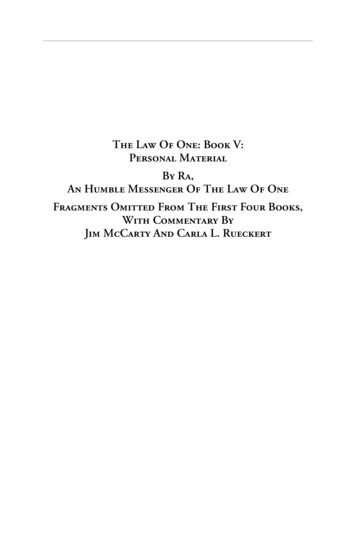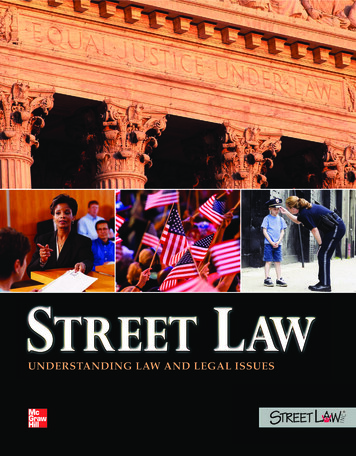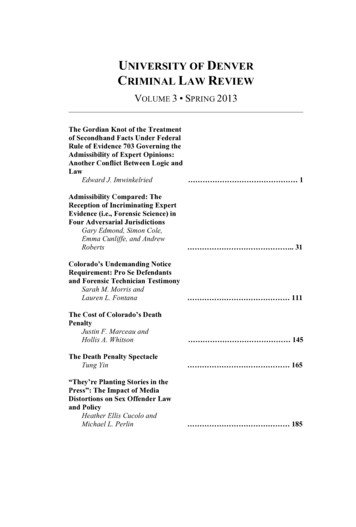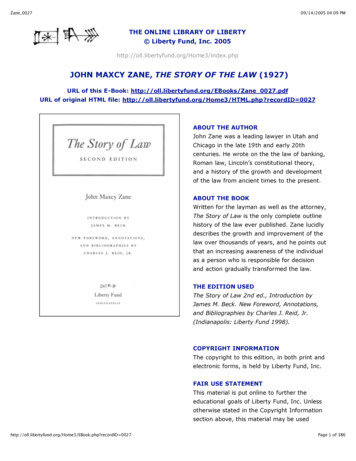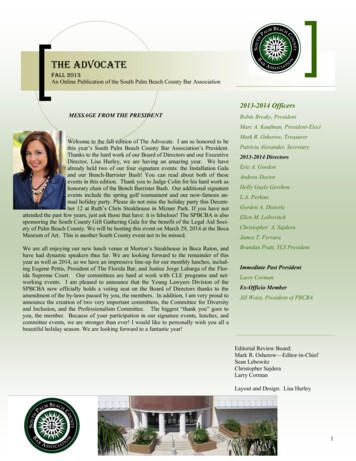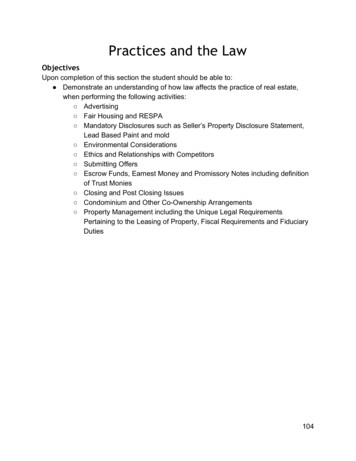
Transcription
Practices and the LawObjectivesUpon completion of this section the student should be able to: Demonstrate an understanding of how law affects the practice of real estate,when performing the following activities: Advertising Fair Housing and RESPA Mandatory Disclosures such as Seller’s Property Disclosure Statement,Lead Based Paint and mold Environmental Considerations Ethics and Relationships with Competitors Submitting Offers Escrow Funds, Earnest Money and Promissory Notes including definitionof Trust Monies Closing and Post Closing Issues Condominium and Other Co-Ownership Arrangements Property Management including the Unique Legal RequirementsPertaining to the Leasing of Property, Fiscal Requirements and FiduciaryDuties104
AdvertisingFair Housing Discrimination in AdvertisingAccording to the Fair Housing Act of 1968 it is Illegal to:Advertise or make any statement that indicates a limitation or preference based on race,color, national origin, religion, sex, familial status, or handicap. This prohibition againstdiscriminatory advertising applies to single-family and owner-occupied housing that isotherwise exempt from the Fair Housing Act.This law is administered by the Department of Housing and Urban Development (HUD).Example of non-discriminatory advertisements:Example 1: Beautiful modern home on a large wooded lot. Four bedrooms, three bathswith a huge deck over-looking the Puget Sound. Well appointed with granite countertops, tile backsplash and new cabinets in the kitchen. Slate tile in entry way. Newlyremodeled baths with new fixtures. Central vacuum cleaner. Just minutes to majorarterials. The spacious three car garage has 220 wiring. New roof in fall 2016. 699,990.For further information, please contact Judy Smith at XYZ Realty at (555)555-5555.Example 2: Single story, rambler style 3 bedrooms, 1 bath home with a 2 car attachedgarage. Beautiful lush garden with a hot tub. Kitchen has been updated and includesstainless steel appliances and tile floors and marble countertops. Spacious deck withbuilt-in seating. New composition roof was installed in the spring. New insulated windowsinstalled in the winter of 2015. All interior rooms newly painted spring. Washer and dryerincluded in the sale. 299,000. For further information contact Sue Yen of ABC Realty at(555)555-5555.Here is an Example of Discrimination in Advertising:Example: Marc, a broker with ABC real estate had a listing with the Sims. He placed anadvertisement in the newspaper for their property saying that the property was in a greatJewish neighborhood and invited all Jewish people to view the home.This is a violation of discrimination in advertising based on national origin.Other Advertising IssuesLicensees must state their name as licensed and the name of the brokerage on alladvertising material. This includes, but not limited to: Signage105
FlyersMailed itemsNewspaper and magazine adsElectronic e-mail advertisingBusiness cardsFair HousingThe Civil Rights Act of 1866 guaranteed property rights to all, regardless of race. Weneglected to enforce those laws and as a result the US passed the Civil Rights Act of1964 and the Civil Rights Act of 1968, which added color, national origin, religion andsex.Fair housing is a set of laws that regulate how and to whom housing is offered andprovided. The main concept of fair housing is housing has to be offered withoutdiscrimination. Characteristics of an individual or family cannot be the reason for notproviding housing or for unequal treatment, even in the showing of houses by realestate professionals.There are multiple laws which provide the legal basis for non-discrimination. They wereadopted over time to include additional classes of people, such as the addition of thosewith disabilities. Let’s look at each piece of legislation that makes up fair housing.1866 Civil RightsThe federal Civil Rights Act of 1866 prohibits all racial discrimination in the sale or rentalof property. This law didn’t provide any penalties for those who neglected to follow it, soin essence it was a law with no enforcement. The lack of any enforcement regulationsforced the passage of what we know as the Fair Housing Act.1964 Civil Rights ActSigned by President Lyndon Johnson, it was initially lobbied for by President John F.Kennedy. The law provided for equal rights in voting, desegregation in schools, work,and public facilities. Initially the law lacked in its enforcement abilities but they werestrengthened later with additional bills.106
Fair Housing Act of 1968The Fair Housing Act, Title VIII of the Civil Rights Act, passed in 1968 prohibitsdiscrimination in the sale, rental, and financing of dwellings, and in otherhousing-related transactions, based on race, color, national origin, religion, or sex.Fair Housing Amendments Act of 1988In 1988, an amendment was passed to add disability and familial status includingchildren under 18 living with parents or legal custodians, and pregnant women.The Fair Housing Act in addition to discrimination in the sale and rental of housing,prohibits advertising that indicates a preference to any of the protected classes andbans intimidation, or any interference with a person’s rights based on discrimination.Enforcement of the Fair Housing Act rests with Housing and Urban Development(HUD).One of the provisions of the act exempts religious organizations from religiousdiscrimination. This means that religious organizations can rent units of a complexowned by the organization to only members of the religious group provided they do notmake any restrictions based on race, sex, color or national origin.Regarding racial discrimination, there are no exceptions, and if a seller informs a brokerthat they should let them know the race of any prospective buyer or give instructions asto who should see the property based on a racial profile, this is illegal. A licensee shouldinform the seller that doing so could be a violation of federal law. Agency law generallystates that the broker should follow the instructions of their client, however, if what theclient requests is illegal there is an obligation to refuse. The broker should inform theclient and cannot follow the instructions.Jones v. Mayer CoSupreme court case Jones v. Alfred H. Mayer Co. was a landmark decision thatoverturned previous precedent regarding the enforcement of the 1866 civil rights act.The decision stated congress had the ability to regulate the sale and rental of privateproperty in order to prevent racial discrimination. The big part is the application toprivate property, as opposed to only public property.Housing and Community Development (HCD) Act of 1974Section 109 of Title I was part of the Housing and Community Development Act. TheHousing and Community Development Act is a change to a law passed in 1937. It made107
it illegal for any program or activity that is funded in any way by the federal governmentto discriminate based on race, color, national origin, religion or sex.Title III of the Americans with Disabilities Act of 1990The Americans with Disability Act (ADA) of 1990 provides nondiscrimination protectionfor individuals with disabilities in the areas of employment, public services,transportation, access to public facilities and telecommunications. As stated in the Act,its purpose is “to provide a clear and comprehensive national mandate for theelimination of discrimination against individuals with disabilities.” Most of the ADAprovisions took effect in 1992.Title III covers businesses and nonprofit service companies that are publicaccommodations, privately operated entities offering certain types of courses andexaminations, privately operated transportation, and commercial facilities. Publicaccommodations are private entities who own, lease, lease to, or operate facilitiessuch as restaurants, retail stores, hotels, movie theaters, private schools, conventioncenters, doctors' offices, homeless shelters, transportation depots, funeral homes, daycare centers, and recreation facilities including sports arenas and fitness clubs. Title IIIalso covers transportation services provided by private entities.Public accommodations must comply with nondiscrimination requirements that prohibitexclusion, segregation, and unequal treatment whenever it is reasonable to do so. Theyalso must comply with specific requirements related to architectural standards for newand altered buildings; reasonable modifications to policies, practices, and procedures;effective communication with people with hearing, vision, or speech disabilities; andother access requirements. Also, public accommodations must remove barriers inexisting buildings where it is easy to do so without much expense, given the publicaccommodations resources.Courses and examinations related to professional, educational, or trade-relatedapplications, licensing, certifications, or credentialing must be provided in a place andmanner accessible to people with disabilities, or alternative arrangements must beoffered.All new construction and modifications must be accessible to individuals withdisabilities. Commercial facilities, such as factories, must comply with the ADA'sarchitectural standards for new construction.An individual with a disability is a person who:108
Has a physical or mental impairment that substantially limits one or more majorlife activities; Has a record of such an impairment; or Is regarded as having such impairment.If a tenant has a disability they must be allowed to make changes to the property theyare renting to accommodate the disability. The modifications are at the tenant's expenseand the landlord can require the tenant to make reasonable restoration of the propertyat the end of the lease.Executive OrdersThe Executive Order 11063 was signed by President Kennedy. It prohibits anydiscriminatory practices in the sale or rental of federally owned, operated, or financedproperties. In 1983, President Carter signed Executive Order 12259, which covered theleadership of the government's fair housing efforts. President Carter’s order wasreplaced by an order signed by President Clinton in 1992, Executive Order 12892. Itestablished the Fair Housing Council and requires federal agencies to further fairhousing in their programs and activities, with the Secretary of HUD as the personresponsible for leadership of the effort.Fair Housing and Protected ClassesThe following groups are afforded protection by Federal and State anti-discriminationLaws. These laws prohibit housing discrimination, regardless of intent, based on ninefactors:1.2.3.4.5.6.7.8.9.RaceColorNational OriginReligionSexDisabilityFamilial Status (families with children)AgeMarital StatusThese categories of citizens are referred to as protected classes . The laws apply toany party involved, directly or indirectly, in a housing transaction, such as the sale,rental or financing of housing. This includes landlords, property managers, real estate109
brokers, appraisers and mortgage lenders. Local government and public agencypolicies and procedures are also governed.Administration and EnforcementThe Office of Fair Housing and Equal Opportunity (FHEO) is a part of HUD whichadministers and enforces federal laws and establishes policies that make sure allAmericans have equal access to the housing of their choice.Washington Law’s Effect on Real Estate BrokerageIt is an unfair practice for any licensee, whether acting for himself, herself, or another,because of sex, marital status, sexual orientation, race, creed, color, national origin,families with children status, honorably discharged veteran or military status, thepresence of any sensory, mental, or physical disability, or the use of a trained dog guideor service animal by a person with a disability: Refusing to engage in a real estate transaction Discriminating in terms or conditions of a transaction Discriminating in providing services or facilities in connection with a real estatetransaction Refusing to receive or failing to transmit a bona fide offer Refusing to negotiate Representing that a property is not available for inspection, sale, rental or leasewhen it is in fact available Failing to advise a prospect about a property listing or refusing to allow him/her toinspect the property Publishing any advertisement, notice or sign which indicates directly or indirectlyan intent to discriminate Using any application form or making any record or inquiry which indicates,directly or indirectly, an intent to discriminate Offering, soliciting, accepting or retaining a listing with the understanding that aperson may be discriminated against Expelling a person from occupancy based on specified classes Discriminating in negotiating, executing or financing a real estate transaction Discriminating in negotiating or executing any service or item in connecting with areal estate transaction (such as title or mortgage insurance)110
Inducing or attempting to induce, for profit, anyone to sell or rent by makingrepresentations regarding entry into the neighborhood of a person of specifiedclasses (blockbusting) Inserting in a written instrument relating to real property or honoring or attemptingto honor any condition, restriction or prohibition based on specified classes (anysuch deed discriminating in any credit transaction (whether or not real estaterelated) in denying credit, increasing fees, requiring collateral, or in any otherterms or conditions. Discrimination based on the presence of any sensory, mental, or physicaldisability or the use of a trained dog guide or service animal. If the owner of thereal property occupies the property and the property is 4 or less units thefollowing do not apply. Not to permit at the person’s expense, to make reasonable modificationsof accommodations to the disabled as long as the person agrees torestore any modifications made. The use of a service animal or trained dog.Legal ResidencyEmployers are held responsible if they hire someone who may not legally work in theU.S., but housing providers have no similar responsibilities in our state, and are not heldaccountable if any of their residents are in the U.S. without status. Don’t ask anapplicant for proof of legal status just because he or she has an accent, speaks Englishpoorly, or just “looks foreign” – that risks a fair housing complaint based on nationalorigin or ancestry. Under fair housing laws, asking applicants if they are in the countrylegally is only acceptable if every applicant is asked for proof of legal residency.Example: It is discriminatory for a manager to ask an foreign looking applicant for legalstatus, but not to ask all other applicants.Fairness Lending Act in WashingtonIn Washington state, legislators passed a law specifically regulating fairness in regardsto single family loans. It’s intent is to ensure fair practices and prevent discrimination foranyone seeking financing. The law states: It shall be unlawful for any financial institution, in processing any application for aloan to be secured by a single-family residence to: Deny or vary the terms of a loan on the basis that a specific parcel of realestate offered as security is located in a specific geographical area, unless111
building, remodeling, or continued habitation in such specific geographicalarea is prohibited or restricted by any local, state, or federal law or rules orregulations. Utilize lending standards that have no economic basis.Fair Housing ViolationsBlockbustingThe practice on the part of unscrupulous speculators or real estate agents of inducingpanic selling of homes at prices below market value, especially by exploiting theprejudices of property owners in neighborhoods in which the racial makeup is changingor appears to be on the verge of changing is known as blockbusting .Example: Sheila, a broker for ABC Real Estate, solicited a neighborhood near whereshe lived. She told residents that there were at least two Chinese families moving intothe area and that their property values were sure to decline. This is an example ofblockbusting, which is illegal.SteeringThe practice of directing buyers into or out of certain neighborhoods based on one ofthe protected classes such as familial status or race is steering . Always avoid makingany statement that indicates a preference or discouragement based on someone'sprotected class. A good example of this situation would be telling a family attending anopen house that they might prefer a home on a safer street away from a busyintersection. The statement could be construed as steering the buyers away from thishouse. This would limit their choices as a family with children - and leave a licenseeopen to a complaint of illegal discrimination.Example: Henry, a broker with XYZ Realty, was a buyer’s broker for a family of Mexicandescent, the Garcias. Henry scheduled a time with the Garcias to tour a group of homes.All of the homes that Henry chose to visit were in predominantly Mexicanneighborhoods. Henry is guilty of steering, which is illegal.RedliningA policy of redlining, denying real estate l oans on properties in areas with large minoritypopulations, because of alleged higher lending risks without due consideration beinggiven by the lending institution to the creditworthiness of the individual loan applicant.112
Example: National Bank refused to make a loan to the Smiths. The basis of the refusalfor the loan was that the home that the Smiths wanted to purchase was located in apredominantly Jewish neighborhood and that values may be unstable. This is anexample of redlining and is illegal.Washington Fairness Lending ActThe Washington Fairness Lending Act prohibits unfair lending practices by financialinstitutions in the state of Washington. Redlining is specifically prohibited under thefairness act. Lenders when dealing with particular loans such as FHA, VA, andconventional must use a uniform standard of practice for payments and interest rateswhen dealing with loan guidelines. Varying the terms of a loan includes requiring: A greater down payment than is usual for the particular type of a loan involved, A shorter period of amortization than is usual for the particular type of loaninvolved, Charging a higher interest rate than is usual for the particular type of loaninvolved, A deliberate under appraisal of the value of the property offered as security. Denying or varying the terms of a loan on the basis that a specific parcel of realestate offered as security is located in a specific geographical area, unlessbuilding, remodeling, or continued habitation in such specific geographical area isprohibited or restricted by any local, state, or federal law or rules or regulationspromulgated thereunder. Utilizing lending standards that have no economic basis.Examples of DiscriminationSale or RentalReal estate licensees are always subject to discrimination law when practicing realestate professionally. There are no exemptions as a licensee performing brokerageservices, unlike owner occupied residences, who do not have a real estate license.Example 1: Mr. Macky, a broker for ABC Realty, had a listing on the Browns’ home. Hereceived a call after some potential buyers saw the “For Sale” sign in the Browns’ frontyard. Mr. Macky sensed that they were “foreigners” from their accent when speaking withthem on the phone. Even though the Browns’ property was available, he told thesepotential buyers that the property was already under contract, because he did not wantto sell the Browns’ property to “foreigners.” This is clearly a case of discrimination whenselling a property, race discrimination.113
Example 2: Mrs. Shaw owns a four-bedroom home. She wants to rent one of the roomsin her home. Because this is her private residence and an owner-occupied dwelling withfour or fewer units, Mrs. Smith is exempt from the Fair Housing Act.Example 3: The landlord or property manager says they need to increase the securitydeposit to cover for the kids. Doing so, is housing discrimination based on familial status.Another illegal comment would be “we can’t rent that unit - families aren’t allowed in thatbuilding.Discriminatory ConductAsking others to participate in discriminatory conduct is illegal, even if the licensee doesnot discriminate.Example: Janis, a broker with XYZ Realty, was having lunch with another broker at XYZRealty. Jane said that she had two listings in the neighborhood where she lives. She toldher colleague that she would only be showing her listings to potential buyers who wereMexican, as she didn’t want “a mix in the neighborhood.” Furthermore, she asked hercolleague to do the same. There are two violations of discrimination here: Jane refusingto show homes to all qualified buyers based on race and Jane asking her colleague todo the same. Even if she had just asked her colleague to discriminate that would beillegal.Discriminatory AdvertisementsAny advertising expressing desirability based on national origin or any other protectedclass is deemed a violation of fair housing law. Fair housing laws apply to all types ofadvertising or marketing used in home sales and purchases, including ads innewspapers, on the radio, in magazines, on the internet, on television. There are nofederal regulations regarding advertising, although the U.S. Department of Housing andUrban Development (HUD) has provided guidelines, on flyers, even in comments for alisting in the Multiple Listing Service.Example 1: Marc, a broker with ABC Real Estate, had a listing with the Sims. He placedan advertisement in the newspaper for their property saying that the property was in agreat Jewish neighborhood and invited all Jewish people to view the home. This is aviolation of discrimination in advertising based on national origin.Example 2: Barbara was holding an open house on one of her listings. Some potentialbuyers visited the home and Barbara started a conversation with them. She told thevisitors that this home was in a “mature” neighborhood and that most people were older.She also stated that families with small children would probably not feel comfortable114
living there. In her statement, she has violated Fair Housing Laws for age discriminationand familial status discrimination.Discrimination in BrokerageBrokers cannot choose who to provide services to, and must provide equivalentservices to all. HUD requires display of a fair housing poster with the Equal HousingOpportunity logo at real estate offices. HUD requires that owners and managers displaya fair housing poster with this logo at rental offices as well. This applies to rentalscovered by the federal Fair Housing Act, and to dwellings rented through a real estatebroker/agent. The Seattle Municipal Code requires residential property managers andreal estate professionals within the city limits to prominently display a letter-sized fairhousing poster in their place of business. Failure to display the poster can result infines. Free posters with this logo are available from the fair housing agencies for eachjurisdiction.Example: Real Estate Affordable Rentals, Inc. had an office in the University District inSeattle, Washington. One of the University of Washington exchange students, Raymond,walked into the office to inquire about rental apartments in the local area. Thereceptionist told them they did not have any vacancies but would call him if he left hisphone number. Raymond's potential caucasian roommate , Harry, went into the sameoffice the next day and was offered a choice of four different apartments. Upon returningto the office to inquire what had happened Raymond noticed that this office did notdisplay an Equal Opportunity poster as other rental offices did. Raymond went onlineand read the requirements and made a formal complaint with HUD and the Seattle fairhousing agency. Real Estate Affordable Rentals, Inc. received a substantial fine. Theoffice was also guilty of representing the property as not available when in fact it was.Example: Joe, with ABC Real Estate Consulting, was having lunch with a friend of his,John, from XYZ Realty. Joe told John that he would always be happy to show propertiesto married couples, but not to single people, as he felt that single buyers may not be asserious about buying. Joe was discriminating when he provided brokerage servicesbased on familial status.Discrimination while Providing Brokerage ServicesDiscriminating while providing brokerage services, even if it’s an owner occupiedproperty less than 4 units, is a violation of fair housing law since it is in the course ofproviding real estate services. If the person who owned the home was choosing to doso while selling the home on their own, they would be exempt, provided they ownedfewer than 3 properties and hadn’t used their exemption allowed once every 24 months.115
Example: Bob, a broker with ABC Real Estate Services, took a listing on the Fujikawa'shome. The Fujikawa's requested that their property not be shown to Caucasian people.Bob agreed. Bob was in clear violation of the Fair Housing Laws for discrimination basedon race.Exemptions to Fair Housing LawsSenior Housing ExemptionAlthough the FHAct (Fair Housing Act) was amended in 1988 to prohibit discriminationon the basis of disability and familial status, Congress intended to preserve housingspecifically designed to meet the needs of senior citizens. Housing that meets theFHAct definition of "housing for older persons" is exempt from the law's familial statusrequirement provided that: HUD has determined that the dwelling is specifically designed for and occupiedby elderly persons under a Federal, State or local government program or It is occupied solely by persons who are 62 or older or It houses at least one person who is 55 or older in at least 80 percent of theoccupied units, and adheres to a policy that demonstrates intent to housepersons who are 55 or older.Therefore, housing that satisfies the legal definition of senior housing or housing forolder persons described above, can legally exclude families with children.Other ExemptionsWhile the Fair Housing Act covers most housing, there are a few important exemptions: Single-family home sold without a real estate licensee (provided the owner doesnot have an interest in more than three single-family homes at one time). Thisexemption can only be used once in any 24-month period. Owner-occupied dwellings with four or fewer units. Religious organization or nonprofit group where dwelling can only be sold orrented to a member of the group, where the dwellings are not operated forcommercial purpose and the group does not discriminate in membership. Private clubs which provide incidental lodging to members. Person who has been convicted of the illegal manufacture or distribution of acontrolled substance. “Handicapped” person if that person’s occupancy constitutes a threat to thehealth and safety of others.116
Provisions regarding “familial status” do not apply to duly qualified “housing forolder persons”, where that designation provides special services for those over55, not merely the absence of children. Washington law allows fewer exemptions. While the Federal exemption forreligious organizations and private clubs still apply, owners of four or fewerapartments and those selling/renting without the services of a real estate brokerare subject to state law.Residential Seller Property Disclosure StatementWashington state requires that sellers provide purchasers with a disclosure statementregarding material facts or material defects about a property. This applies to real estatepurchases and also property transfers. This information is based on the seller’s actualknowledge of the property when completing the form. Only the seller of the property cancomplete the statement. It is important to note that real estate brokers or any other thirdparty are prohibited from completing the statement for the sellers.While the seller is responsible for completing the form, it is important to note that thereis liability for the licensee as well. The licensee is responsible for what they know orshould have known. Broker’s are bound by agency law to disclose all material facts.Note: The purchaser may not waive their right to receive a seller’s disclosurestatement if the seller answered yes to any one of the questions in the environmentalsection on the form.ExemptionsExemptions to providing a seller’s disclosure statement applies to the following: A foreclosure or deed-in-lieu of foreclosure. A gift or other transfer to a parent, spouse, or child. A transfer between spouses in connection with a divorce. A transfer where a buyer had an ownership interest in the property within twoyears of the date of the transfer including, but not limited to, an ownershipinterest as a partner in a partnership, a limited partner in a limited partnership, ashareholder in a corporation, a leasehold interest, or transfers to and from afacilitator pursuant to a tax deferred exchange. A transfer of an interest that is less than fee simple.117
A transfer made by the personal representative of an estate or by a trustee inbankruptcy. A transfer in which the buyer has expressly waived the receipt of the sellerdisclosure statement. However, if the answer to any of the questions in thesection entitled "Environmental" would be "yes," the buyer may not waive thereceipt of the "Environmental" section of the seller disclosure statement.Note: A seller who has not occupied the property is not exempt from providing adisclosure statement unless they meet one of the criteria just mentioned.Sections of the Seller Property Disclosure Statement - Improved PropertyThere are ten sections which comprise the Seller Disclosure Statement for improvedproperty.A broker is prohibited from filling out the form for the seller. The seller must fill out theform and disclose all that they know
included in the sale. 299,000. For further information contact Sue Yen of ABC Realty at (555)555-5555. Here is an Example of Discrimination in Advertising: E x a mp l e : Marc, a broker with ABC real estate had a listing with the Sims. He placed an advertisement in the newspaper f





